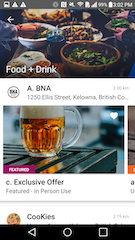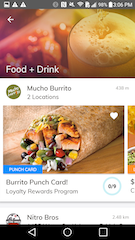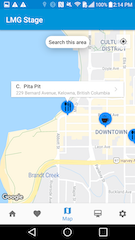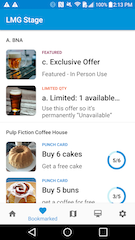Showing & Using Offers
The GetintheLoop Android SDK provides a number of pre-built components to load and display offers in a variety of ways. It also provides consistent interfaces for loading offer and business related data.
Basics
Data Providers
The DataProvider interface is the core mechanism used to query paginated data (collections, businesses, locations) via the SDK. It handles responses, error, and request details like pagination in a consistent manner.
In order to get results from a DataProvider callbacks can be added to any number of the following methods:
| Method | Description |
|---|---|
onFetchSuccess | Invoked when the first page of results loads. This is triggered on first loads and when a force refresh is made. |
onNextPageSuccess | Invoked when a non-first page of results has loaded with the array of results from that page |
onDataChanged | Invoked when any change (load or next page) occurs and re-emits the entire list of data |
onError | Invoked when any exception occurs loading the data |
The DataProvider has several methods for fetching data
| Method | Description |
|---|---|
fetch(Boolean forceRefresh) | Performs a fetch with the current params set on the DataProvider. Passing true to forceRefresh will ensure that the data is fetched from the network instead of a cached version |
refresh() | Equivalent to calling fetch(true) |
fetch(P params, Boolean forceRefresh) | Performs a fetch with the given params. Setting forceRefresh to true will ensure fresh data is fetched from the api instead of using the cache |
loadNextPage() | Performs a next page fetch with the previously set params |
cancel() | Cancels any in-progress data fetching |
dispose() | Removes all callbacks provided to the DataProvider and cancels any ongoing requests |
It is vital to call dispose() on the DataProvider when the containing Activity or Fragment is destroyed so that all calls are canceled and the callbacks are freed. Failing to call dispose() will result in memory leaks.
Data providers react to changes to global content filters, and reload automatically as soon as filter changes or gets removed.
Collections
Searching Collections by Tag
Lists of collections can be retrieved with the following code:
- Kotlin
- Java
import com.loopmediagroup.LoopMediaGroup
import com.loopmediagroup.domain.data.Collection
import com.loopmediagroup.domain.data.params.CollectionListRequestParams
import com.loopmediagroup.provider.DataProvider
val provider = LoopMediaGroup.client().collections()
// The data provider has 4 methods available to
provider.onFetchSuccess { collections ->
// Emits the first page of items on every successful fetch.
}
provider.onNextPageSuccess { collections ->
// Emits a page of items on every successful next page fetch
}
provider.onDataChanged { collections ->
// Emits the entire new list on every successful fetch or next page fetch
}
provider.onError {throwable ->
// Emits exceptions that occur during a fetch
}
val params = CollectionListRequestParams.Builder()
.useDeviceLocation(true)
.tags(listOf("food", "drink"))
.build()
// Load the collections for the given parameters
provider.fetch(
params = params,
forceRefresh = false // Change to true to force skipping the cache
)
// Loads the next page after a successful load.
provider.loadNextPage()
// Refreshes from the api with the current params
provider.refresh()
import com.loopmediagroup.LoopMediaGroup;
import com.loopmediagroup.domain.data.Collection;
import com.loopmediagroup.domain.data.params.CollectionListRequestParams;
import com.loopmediagroup.provider.DataProvider;
DataProvider<Collection, CollectionListRequestParams> provider = LoopMediaGroup.client().collections();
provider.onFetchSuccess(collections -> {
// Handle collection first page fetched
return Unit.INSTANCE;
});
provider.onDataChanged(collections -> {
// Handle the full list of collections when changed
return Unit.INSTANCE;
});
provider.onError(throwable -> {
// Handle exceptions
return Unit.INSTANCE;
});
provider.onNextPageSuccess(collections -> {
// Handle additional page loads
return Unit.INSTANCE;
});
List<String> tags = new ArrayList<>();
tags.add("Food");
tags.add("Drink");
provider.fetch(
new CollectionListRequestParams.Builder()
.tags(tags)
.useDeviceLocation(true)
.build(),
false
);
// Loads the next page after a successful load.
provider.loadNextPage();
// Refreshes from the api with the current params
provider.refresh();
Showing Collections
Collection details and contents can be displayed as either a fragment or an activity.


CollectionActivity
Collections displayed with the CollectionActivity contain a collapsing header, collection details, and nested lists of businesses with their offers.
From an Activity
- Kotlin
- Java
import com.loopmediagroup.ui.collections.CollectionActivity
startActivity(CollectionActivity.createIntent(this, "collectionId"))
import com.loopmediagroup.ui.collections.CollectionActivity;
startActivity(CollectionActivity.createIntent(this, "collectionId"));
From a Fragment
- Kotlin
- Java
import com.loopmediagroup.ui.collections.CollectionActivity
startActivity(CollectionActivity.createIntent(context!!, "collectionId"))
import com.loopmediagroup.ui.collections.CollectionActivity;
startActivity(CollectionActivity.createIntent(getContext(), "collectionId"));
CollectionFragment
Collections displayed with the CollectionFragment contain only the nested lists of businesses with their offers.
From an Activity
- Kotlin
- Java
import com.loopmediagroup.ui.collection.CollectionActivity
supportFragmentManager.beginTransaction()
.add(R.id.container, CollectionFragment.newInstance("collectionId"))
.commit()
import com.loopmediagroup.ui.collection.CollectionActivity;
getSupportFragmentManager().beginTransaction()
.add(com.loopmediagroup.client.demo.R.id.container, CollectionFragment.newInstance("collectionId"))
.commit();
Using Offers
Although showing Offer Details, Business Details, and Redeeming offers can be done through methods on the SDK, there is generally no need to manually handle these functions. Redemption views and UI flow are all handled automatically by the SDK.
Advanced Views
Offers Map

The Offers Map loads and displays locations and businesses in a GoogleMap. This LocationMapBrowserFragment handles clustering, loading and map view events.
Initialization
A LocationMapBrowserFragment can be initialized and added to any activity with the following code.
- XML
- Kotlin
- Java
<fragment
android:layout_width="match_parent"
android:layout_height="match_parent"
class="com.loopmediagroup.ui.location.browser.LocationMapBrowserFragment"
/>
import com.loopmediagroup.ui.location.browser.LocationMapBrowserFragment
supportFragmentManager.beginTransaction()
.add(R.id.container, LocationMapBrowserFragment.newInstance())
.commit();
import com.loopmediagroup.ui.location.browser.LocationMapBrowserFragment;
getSupportFragmentManager().beginTransaction()
.add(R.id.container, LocationMapBrowserFragment.newInstance())
.commit();
When the map is first displayed it will try to get the current device location and centre on that location.
If a geographic Content Filter has been set, the map will show that area by default. If the users currently location can be determined, and is inside the content filter area, then it will be shown and the map will be centred on the user location.
If there is no location, or the location is outside of the current content filter, the filter area will be shown centred on the content filter area centre.
Offers are first loaded automatically based on the initial map location. Additional loading is manually triggered by a Search for offers button that shows on the map.
Optional Map Configuration
The initial location of the map can be manually set when the fragment is instantiated.
LocationMapBrowserFragment.newInstance(
Options(
defaultLocation = LatLng(55.585901, -105.750596),
defaultZoom = 5f
)
)
Map pin colours can be customized via the lmgColorBrand and lmgColorBrandVarient theme colors.
Offer Search
Offer searching is provided by the SearchFragment. This fragment must hosted by an activity that contains an android.support.v7.app.ActionBar in order to display the search widget in the app bar. The fragment will automatically add the search widget icons and text entry into the app bar menu.
The fragment handles all searching, text entry and filtering as required.
- Kotlin
- Java
import com.loopmediagroup.ui.search.SearchFragment
supportFragmentManager.beginTransaction()
.add(R.id.container, SearchFragment.newInstance())
.commit()
import com.loopmediagroup.ui.search.SearchFragment;
getSupportFragmentManager().beginTransaction()
.add(R.id.container, SearchFragment.newInstance())
.commit()
Additional Features
Bookmarked Offers
Bookmarked offers are available ONLY to identified users. See Tracking Audience for more detail on identifying your users.
Use ignoreContentArea to filter or not results depending of Content Area

Enable Bookmarking
Bookmarking is disabled by default. To enable the bookmarking action, create a config.xml under main\res\values and add the following line.
<?xml version="1.0" encoding="utf-8"?>
<resources>
<bool name="lmg_showBookmarkAction">true</bool>
</resources>
Showing Bookmarked Offers
supportFragmentManager.beginTransaction()
.add(R.id.container, BusinessListFragment.newInstance(
BusinessListFragment.Options.Builder()
.contentType(BusinessListFragment.ContentType.Bookmarks)
.build()
)
.commit()
Punch Card & Reward Offers
Rewards offers are available ONLY to identified users. See Tracking Audience for more detail on identifying your users.
Use ignoreContentArea to filter or not results depending of Content Area
Showing In Progress Offers
supportFragmentManager.beginTransaction()
.add(R.id.container, BusinessListFragment.newInstance(
BusinessListFragment.Options.Builder()
.contentType(BusinessListFragment.ContentType.InProgress)
.build()
)
.commit()
Showing Earned Offers
supportFragmentManager.beginTransaction()
.add(R.id.container, BusinessListFragment.newInstance(
BusinessListFragment.Options.Builder()
.contentType(BusinessListFragment.ContentType.Earned)
.build()
)
.commit()
Sharing
The GetintheLoop SDK allows you to share links to offers and businesses available inside your integration. Links point to your Public Offer Viewer by default.
Enable Share Links
<?xml version="1.0" encoding="utf-8"?>
<resources>
<bool name="lmg_enableShareAction">true</bool>
</resources>